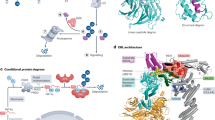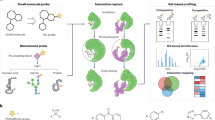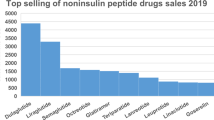Abstract
Urine from cancer patients with weight loss showed the presence of an antigen of M(r) 24,000 detected with a monoclonal antibody formed by fusion of splenocytes from mice with cancer cachexia. The antigen was not present in the urine of normal subjects, patients with weight loss from conditions other than cancer or from cancer patients who were weight stable or with low weight loss (1 kg month(-1)). The antigen was present in the urine from subjects with carcinomas of the pancreas, breast, lung and ovary. The antigen was purified from urine using a combination of affinity chromatography with the mouse monoclonal antibody and reversed-phase high-performance liquid chromotography (HPLC). This procedure gave a 200,000-fold purification of the protein over that in the original urine extract and the material isolated was homogeneous, as determined by silver staining of gels. The N-terminal amino acid sequence showed no homology with any of the recognized cytokines. Administration of this material to mice caused a significant (P<0.005) reduction in body weight when compared with a control group receiving material purified in the same way from the urine of a normal subject. Weight loss occurred without a reduction in food and water intake and was prevented by prior administration of the mouse monoclonal antibody. Body composition analysis showed a decrease in both fat and non-fat carcass mass without a change in water content. The effects on body composition were reversed in mice treated with the monoclonal antibody. There was a decrease in protein synthesis and an increase in degradation in skeletal muscle. Protein degradation was associated with an increased prostaglandin E2 (PGE2) release. Both protein degradation and PGE2 release were significantly reduced in mice pretreated with the monoclonal antibody. These results show that the material of M(r) 24,000 present in the urine of cachectic cancer patients is capable of producing a syndrome of cachexia in mice.
This is a preview of subscription content, access via your institution
Access options
Subscribe to this journal
Receive 24 print issues and online access
$259.00 per year
only $10.79 per issue
Buy this article
- Purchase on Springer Link
- Instant access to full article PDF
Prices may be subject to local taxes which are calculated during checkout
Similar content being viewed by others
Author information
Authors and Affiliations
Rights and permissions
About this article
Cite this article
Cariuk, P., Lorite, M., Todorov, P. et al. Induction of cachexia in mice by a product isolated from the urine of cachectic cancer patients. Br J Cancer 76, 606–613 (1997). https://doi.org/10.1038/bjc.1997.433
Issue Date:
DOI: https://doi.org/10.1038/bjc.1997.433
This article is cited by
-
The role of inflammation in adjuvant chemotherapy-induced sarcopenia (Izmir Oncology Group (IZOG) study)
Supportive Care in Cancer (2020)
-
Omega-3 fatty acids: physiology, biological sources and potential applications in supportive cancer care
Phytochemistry Reviews (2014)
-
Cancer cachexia: impact, mechanisms and emerging treatments
Journal of Cachexia, Sarcopenia and Muscle (2013)
-
Disruption of pro‐oxidant and antioxidant systems with elevated expression of the ubiquitin proteosome system in the cachectic heart muscle of nude mice
Journal of Cachexia, Sarcopenia and Muscle (2013)
-
Sarcopenia and cachexia: the adaptations of negative regulators of skeletal muscle mass
Journal of Cachexia, Sarcopenia and Muscle (2012)



